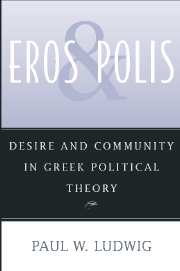Book contents
- Frontmatter
- Contents
- Acknowledgments and a Note on Citations
- Introduction
- PART ONE Political Eros: An Account from the Symposium
- PART TWO The Discourse of Political Eros
- THREE Scientific and Poetic Traditions of Eros in Thucydides
- FOUR The Problem of Aggression
- FIVE The Problem of Sublimation
- PART THREE The Polis as a School for Eros
- List of Works Cited
- Index
FOUR - The Problem of Aggression
Published online by Cambridge University Press: 10 December 2009
- Frontmatter
- Contents
- Acknowledgments and a Note on Citations
- Introduction
- PART ONE Political Eros: An Account from the Symposium
- PART TWO The Discourse of Political Eros
- THREE Scientific and Poetic Traditions of Eros in Thucydides
- FOUR The Problem of Aggression
- FIVE The Problem of Sublimation
- PART THREE The Polis as a School for Eros
- List of Works Cited
- Index
Summary
At this juncture it seems proper to begin to bring the ancient discourses of political eros into closer dialogue with modern theory. Was there an eros in ancient Greece, or in any other time or place, that drove people to desire domination over others? The problem of aggression still bedevils liberal and postmodern interpretations of rape, which for a time had ceased to be an erotic crime. The commonplace that rape is a crime of violence, not sex, was an assumption of the Left for the better part of the twentieth century and remains the liberal account today. In the liberal account, violence and eros are unnatural partners. During the sexual revolution this dichotomy was bolstered by a psychological theory: repressing sexual energy leads to violence, whereas removing the impedances to sexuality accordingly enables the individual to choose the natural, pacific outlet. “Aggression reduces to sex.” This formula contained more optimism than Freud's repression theory originally intended. More recently, all thought about sexuality has been rewritten by Foucault. The new account is pessimistic and owes its underpinnings to Nietzsche. Power is a fundamental component of sexuality in this theory. Intellectual honesty about liberation, viz., that the act of liberating oneself is an exercise of power in its own right, gives rise to the suspicion that, contrary to the earlier hope, “sex reduces to aggression.” Acceptance of the latter formula would seem to signal the death knell of liberal public law regarding sexuality.
Information
- Type
- Chapter
- Information
- Eros and PolisDesire and Community in Greek Political Theory, pp. 170 - 220Publisher: Cambridge University PressPrint publication year: 2002
